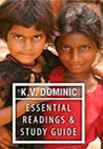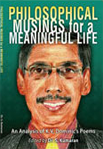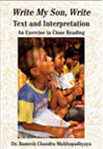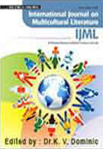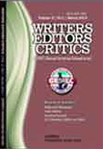Books Review in Detail
Review Of Sarojini Sahoo’s Review of K. V. Dominic’s Winged Reason
Sarojini Sahoo’s Review Of Winged Reason
Reading Winged Reason:  A Very Different Experience
K.V. Dominic. Winged Reason. New Delhi: Authorspress, 2010.
pp. 77. Price Rs. 95/-. ISBN 978-81-7273-530-2
Â
Dr. Sarojini Sahoo
(APPEARED ON KOHINOOR VOL. 9, 2011)
Â
As poetry is the sum up of feelings and emotions that we must encounter during our lives, in some way a poet cannot remain alien from society through his poems.  We need some kind of a deep, objective understanding of the relationship between poetry and society, something that gets beyond claiming that poetry is a non-anecdotal individual approach and committed to poetry itself not to society by any means. Among the Academics of Critical writing in Indian English Literature, K. V. Dominic is now a well known personality for his genuine inclination to explore new vistas of knowledge. In his poems he can successfully hypnotise the readers  with his  impressive observations on  the unending traumatic condition of human, even those who do not appreciate metaphors–easily abandons  the potency of metaphorisation because it is theorised that the importance of the message alone can and do really make literature.  Dominic is not at all ditching up metaphors and the mango tree in his poem “I am Just a Mango Tree†becomes a triumphant representation of oppressed and depressed mankind. The subject matter starts with a feeling of completeness when the poet describes:
I am just a Mango Tree
Still an accomplished life,
I’ve fulfilled my Creator’s plan.
But the poem is harrowing and heart-breaking in equal measure as the readers proceed more and at the end, that is genuinely uplifting and (this actually makes one feel guilty at first) leaves readers in a melancholy. Not only the mango tree, but also Nature and all subjects of Nature like Sun, Moon, and Cuckoo may seem to be used as metaphor in Dominic’s poems. Why ‘Nature’ does play an important role in poet’s soul and pen? Dominic justifies with his own words that “I believe in the concept of jeevatma and paramatma (individual soul and universal soul) and that all living beings are part of Paramatma or God. Again I believe in the Indian concept of Aham Brahmasmi (I am the God). Advaita seems to me more reasonable and acceptable than Dvaita. Thus I find the eternal affinity between Man, Nature and God (Page 14: Preface).
But what attracts the poet is not a metaphor, but the social themes, especially the social lapses and the results of these defects on the social order. The poet proceeds in his depiction through a sympathetic tone towards destiny of mankind. The social themes in Dominic’s poems, as described by D. C. Chambial in the ‘blurb’ of the book, are religious harmony, poverty, corruption, suffering, human cruelty, mafia crying, old age problem of aloofness, misappropriation of money, haves and have-nots, problems of the handicapped, female foeticide, the evil of dowry, disparity, unemployment and neglect of intellect.  But apart from these social themes, the main facet of poems in Dominic’s book is that the poems are very simple (sorry, if I have been misunderstood) for the common man when, indeed, the common man is in need of sublime profundity of literature, create a literary precedence bereft of aesthetics but impregnated with impotent ideologies. It is our perception that poetry is naturally an intellectualised domain and a common man often wants to escape into it to test the metre of his intellectualism. But after reading Dominic’s poems in the book one can realise how the poet has proved these perceptions as a kind of fallacy that is associated with pseudo intellectualism.
The poems of the book can be divided into two major groups. Two of them are written in memory of known personalities with whom the poet has shared his own experiences and rests are from poet’s personal observation on social subjects. Though the poet has not written any poem in Haiku pattern, but Pranab Kumar Majumder, who wrote  the Foreword note at the beginning of the book, has observed the fragmentation of some poems can be identified as the example of successful Haikus.
“The Sun Kisses
The eye opens
Lotus bloomsâ€
(“Nature’ Bountiesâ€)
The poet has admitted that he is influenced by the Romantic poets like Blake, Wordsworth, Shelly and Keats and the Victorians like Browning, Tennyson and Arnold. Among Indian poets, Jayanta Mahapatra is his favourite, though the poet makes a declaration that he is influenced by all of his contemporaries.
Reading Dominic through his poems is a great experience as it is totally a different approach from the contemporary modern Indian poems and this unique attribute makes Dominic a special as a maker of different verses.
Dr. Sarojini Sahoo (distinguished bilingual South Asian feminist writer, Novelist, Poet, Short Story Writer, Critic) Orissa, India.
Sarojini Sahoo is a distinguished bilingual South Asian feminist writer, and an associate editor of a feature-oriented English journal Indian AGE. She has been conferred with the Orissa Sahitya Academy Award 1993, the Jhankar Award 1992, the Bhubaneswar Book Fair Award and the Prajatantra Award.
Address:
Dr. Saorjini Sahoo
B/10, Officers’ Colony
Rampur Colliery
Brajrajnagar
Jharsuguda, Orissa- 768 225

